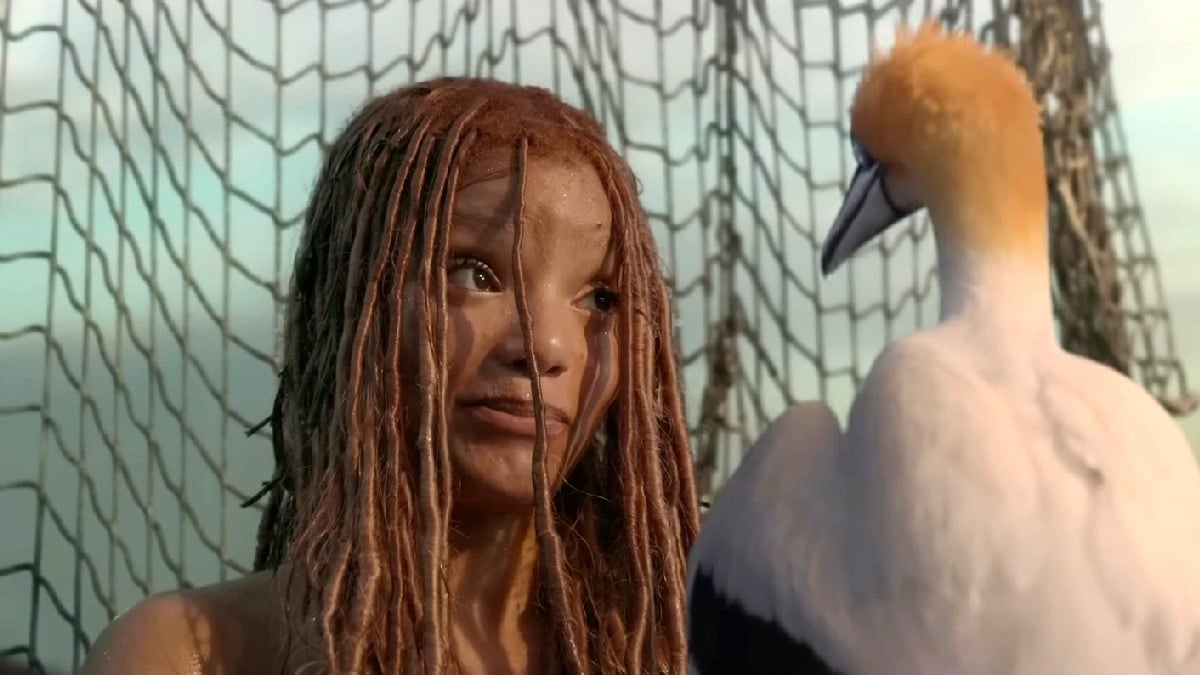The Little Mermaid has been drawing the attention of the world for months now; whether it was in anticipation for Halle Bailey‘s performance (in which she spectacularly proved her haters wrong), the new and reimagined musical numbers and accompanying visuals, or simply the wave of nostalgia that long-time Disney fans can now begin to share with younger generations, there was a lot to look forward to, and for the most part, The Little Mermaid delivered.
But with the original film clocking in at under 90 minutes and the reboot exceeding two hours, the more narratively-inclined patrons may have been mostly interested in how this new film would beef up the plot into something more than a lackluster love story. And, to its credit, the remake certainly improved on the original in that space; the aforementioned romance plot, which anchors much of the movie like its predecessor before it, found some much better legs in live-action, with Jonah Hauer-King‘s Prince Eric being a much more suitable other half to Halle Bailey’s Ariel than his animated counterpart.
This, however, can never overshadow the fact that romance is a fundamentally flawed genre that we desperately need to redefine the parameters of, nor the fact that Ariel and Eric’s romance, despite being much more justifiable in the remake, is, to be quite frank, excruciatingly boring.

Romanticization is one of the most well-worn assets in the storyteller’s toolbox, as it should be; championing hope, heroism, and the well-earned overcoming of adversity in one’s story is an endeavor to be admired.
Romanticizing romance, on the other hand, is quite the opposite of admirable, especially when modern, real-life nuances are factored in to it all; putting aside the fact that the overwhelming majority of on-screen romances are heinously unrealistic (and those that are realistic typically aren’t the ones that moviegoers like to watch), the growing access to parasocial equivalents of human connection makes the consumption of these starry-eyed, romanticized relationships all the more detrimental to both the individual’s grasp on healthy, more sober romance, and the standards held by the wider zeitgeist.
The Little Mermaid, of course, isn’t the only film centered on romance, so why exactly am I calling this movie out in particular?
Simply put, the remake had every tool and reason at its disposal to turn its back on Disney’s history of romanticized romance, and all it did instead was take a tedious love story and make it bigger, all without making it less tedious.
The original Little Mermaid‘s love story has been quite famously lambasted, and rightfully so; Ariel glances at Prince Eric for all of two seconds before making it her life mission to marry him, effectively prioritizing that over her original desire to explore the human world. Suffice to say that improving on this wasn’t much of a challenge.
Speaking of which, the remake tries to solve this by giving Prince Eric a proper personality that’s not dissimilar to Ariel’s adventurous spirit, and goes a step further by rearranging some plot elements to make their relationship feel more organic.
And yet, both iterations suffer the same fate of being reprehensibly boring from a storytelling perspective; the romance itself does not challenge Ariel in any way (they’re perfect for each other as adventurers, he’s the key to her life on land, where’s the tension that comes with this goal outside of overcoming some CGI-heavy set pieces?), and, like most on-screen romances, it paints an unrealistic picture of what romance actually looks like. Things may have been different if the story was centered more on Prince Eric, but the movie isn’t called The Little Prince.
And given that this creative team was armed with staggering amounts of hindsight and source material, there’s absolutely no excuse to keep going down the tired, pointless romance route; Ariel’s character, at its genesis, is a storyteller’s dream, and there’s so much justice that could have been done for her.
How The Little Mermaid could have defied the flimsy romance route

The character of Ariel is, at her worst, a doe-eyed prince-chaser. She’s at her best when she’s being loud about her desire to explore and integrate with the human world, underlined by her fascination with the many relics from above that have fallen beneath the waves; Ariel isn’t a trophy wife, she’s a gung-ho anthropology geek.
Ariel wants to go to the human world, her powerful father forbids it, so she has to take matters into her own hands if she wants to achieve her goal. That, of course, brings us to Ursula, who can help Ariel get what she wants, but not without a substantial sacrifice from the young mermaid.
Now, the movies, as they stand, paint Ariel’s sacrifice as giving up her life in the ocean with the added hurdle of needing to kiss Eric in order to keep her human legs. The problem is that neither of those things are actual sacrifices for Ariel; at no point does she experience homesickness for the sea, nor does she seem to have any qualms about kissing Prince Eric (quite the opposite, in fact); so, for a movie about sacrifice (which is further based on a fairy tale that’s very much about sacrifice), it seems bizarrely disinterested in wrestling with such an idea.
The tragedy of it all is that the perfect opportunity for subversion was staring them right in the face; imagine, just for one moment, if Ursula’s stipulation of Ariel needing to woo Eric was written as a sacrifice/irritation on Ariel’s part. Imagine if Ariel’s reaction to needing to kiss Eric was less “Hell yeah!” and more “What? You mean I have to kiss this guy to go explore the human world? Ugh, the things I do…”
Not only would this disallow the need to beef up Eric as a character (in fact, his animated counterpart would have worked even better in this scenario), but it would put a proper, internally challenging obstacle in Ariel’s way; if she has to achieve her goals by being with Eric begrudgingly rather than enthusiastically, how might she have handled the conflict between her aspirations and what she has to do in order to realize them?
This in turn would open the door for many more interesting changes. Ursula’s stipulation, for instance, could have been a bluff all along, turning Ursula into more of a scheming antihero who wants to challenge Ariel to arrive at her truth; if Ariel loses herself by being with Prince Eric, would she be able to recognize that as an unworthy and unnecessary sacrifice compared to, hypothetically, the challenges that come with going off into a brand new world all on your own, which would open worlds of wonder for Ariel if she chose to face them and subsequently overcome them? Indeed, turning Ursula into a less antagonistic aunt with proper tough-love techniques would have been a glorious change to facilitate a story about sacrifice; we can only imagine what the dynamic with the patriarchal Triton could have been.
But instead of any of this, we simply got a beat-for-beat remake that had no creative desire outside of being bigger and louder than its animated counterpart. Credit where credit is due; it’s doing amazing things for young Black girls who are smiling wider than ever before, but The Little Mermaid is not beyond critique, and its choice to relent to tired, arguably harmful romance norms was an especially lamentable missed opportunity, all things considered.

